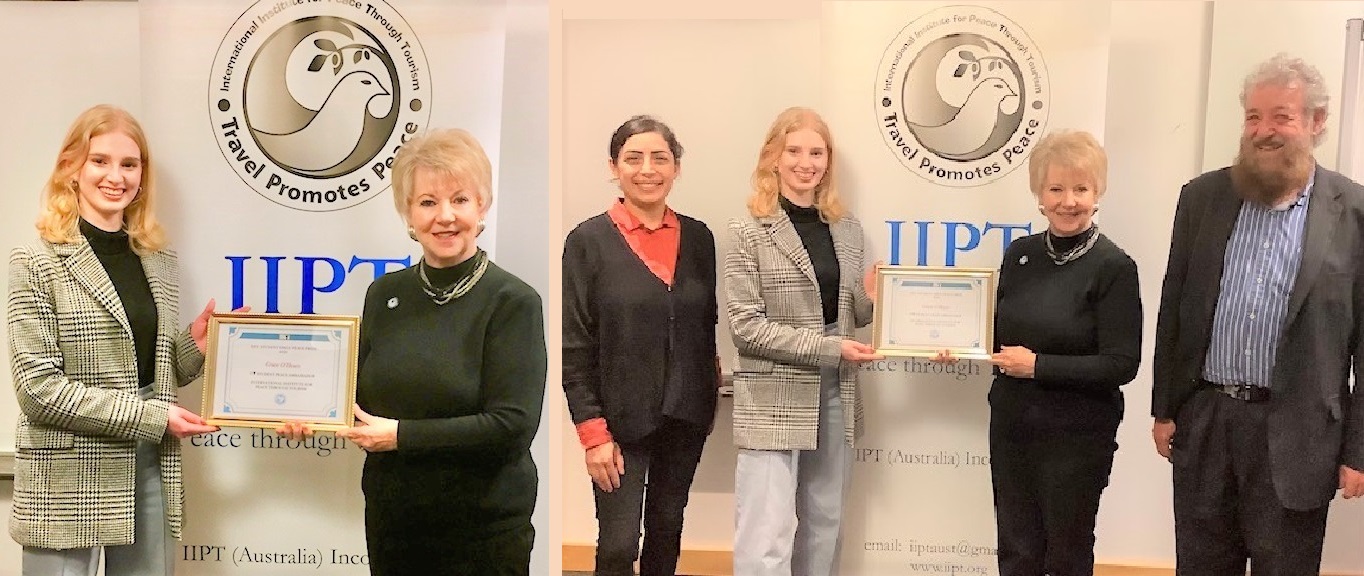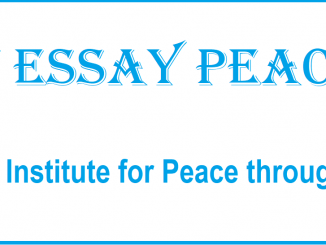
Is awarded to : Grace O’Hearn
On the topic of Developing Sustainable Destinations In particular the Question of:-
“As Generation Z looks to become one of the principal drivers for tourism’s recovery from COVID-19, what will it mean for the youth of today to travel for peace? How might we balance their individual travel desires with their collective responsibility to society and the planet?”

The recent growth of the Generation Z travel market has the potential to cause a significant shift in travel demand (ETC, 2020). On an individualistic level, Generation Z is often described as hyper-connected, self-focused and motivated by the fear of missing out (Haddouche & Salomone, 2017; Robinson & Schanzel, 2019). The fear of missing out motivates Generation Z to travel to bucket-list destinations such as Venice. Venice, except for 2020, draws 20 million tourists each year, which cause and exacerbate a range of negative social, environmental and economic impacts (Momigliano, 2020).
In a post-COVID world, Generation Z could facilitate a change in the global tourism industry, seeing it focused more on sustainability and peace principles which will mitigate various issues present pre-COVID. The International Institute of Peace Tourism establishes many peace principles and educates on the role of tourism in generating peace in destinations. As part of this, the IIPT has developed the Credo for Peaceful Travellers to guide tourists (IIPT, n.d). This credo will be utilised to reflect upon my personal experiences as a tourist in Venice pre-COVID and determine how Generation Z travellers such as myself can better balance their individual travel preferences with the critical notion of travelling for peace.
While there is much academic discussion surrounding tourism’s potential for encouraging peace, there has been little evidence to prove this causal relationship (Pratt & Liu, 2016). Litvin (1998) suggests that tourism is more likely to be the beneficiary of peace rather than a cause of it, as tourism tends to benefit from conditions of stability and safety that characterise a peaceful destination. However, it is pivotal to recognise that peace comes in two forms, positive and negative peace. These forms were first described by Galtung (1969), where negative peace is the absence of war, violence and other highly unsafe conditions. On the other hand, positive peace focuses on the cultivation of social justice, international
understanding, active cooperation and cultural understanding (Galtung, 1969). While Pratt and Liu (2016) and Litvin’s (1998) arguments suggest tourism’s difficulty in fostering conditions of negative peace, there is a strong potential for tourism to aid in developing positive peace in destinations.
Farmaki (2017, p. 528) explains that to travel for positive peace is to “positively influence international politics and foster world peace by reducing cultural and psychological gaps among people”. The IIPT integrates this sentiment in their Credo for Peaceful Travellers, which encourages tourists to travel in a way that promotes positive peace (IIPT, n.d). One aspect of the credo is that travellers should ‘revere and protect the natural environment which sustains all life’ (IIPT, n.d). The European Travel Commission’s (ETC) (2020) study on Generation Z travellers deduced that for most of Generation Z, environmental concerns, especially for climate change, are the most significant of all generations, emphasising their reverence for the environment. However, less than half of Generation Z are enthusiastic about adopting sustainable methods such as using public transport, decreasing their energy and water consumption and offset their carbon emissions during their travels (ETC, 2020). These findings suggest that while Generation Z does largely revere the natural environments of destinations they travel to, more than half fail to protect them as best possible.
That Generation Z’s sustainability values and their actions fail to reconcile, highlights a distinction of individual values within Generation Z, which Buffa (2015) explains as hard vs soft path young tourists (HPYT vs SPYT). HPYT value more harsh ecotourism efforts to sustain the natural environment, whereas SPYT value their comfort over sustainability efforts (Buffa, 2015). Venice suffers from various environmental issues primarily bought about or worsened by tourism, including the pollution of waterways and consequential decrease in
biodiversity, flooding, or ‘aqua alta’ and damage to infrastructure such as bridges (Bertocci et al., 2020). Considering these impacts, HPYT may avoid visiting Venice altogether to limit their environmental impact on the city. In contrast, SPYT may still visit the city as their desire to travel to Venice outweighs their value of sustainability.
I may fit more so into the SPYT category, as pre-COVID, I have visited Venice twice. I visited and returned even though I was aware of the damaging environmental impact of my presence because I valued the travel experience more than my potential impact. I do heavily value travelling for positive peace; however, as someone so passionate about travel that I study it at university, balancing my strong travel desires and my values of sustainability is incredibly difficult. As the literature suggests, I am not alone in these feelings; most Generation Z find balancing their individual desires complex (ETC, 2020).
A dominant perspective is that it is ultimately the role of destination management organisations such as Visit Venezia and the government to intervene to limit the destination’s carrying capacity (Bertocci et al., 2020). However, Generation Z travellers, especially SPYT, should still follow the IIPT’s credo to protect the environment by adopting sustainable actions while travelling. Post-COVID, if I return to Venice, I will consider implementing sustainable measures such as walking instead of catching the Vaporetto, bringing my own plate and cup when having takeaway Cicchetti by the canal, and avoid major walking routes to disperse the load on the fragile infrastructure. These actions will assist in protecting Venice’s environment by reducing my impact. To ensure that tourism recovers post-COVID in a more environmentally conscious way, for HPYT in Generation Z, fragile destinations such as Venice could be avoided if possible. For SPYT, where individual desires are more influential, strategies to minimise environmental impacts should be implemented throughout
their travels. This will effectively meet the IIPT’s credo of revering and protecting a destination’s environment, working towards positive peace.
Another critical aspect of the IIPT’s credo is ‘to support travel services that share these views (on peace travel) and act upon them’ (IIPT, n.d). This is similar to the maxim, ‘put your money where your mouth is’, which in this context, expresses the duty to support sustainability beliefs with actions, including purchasing decisions, that foster positive peace. The sharing economy’s Airbnb is a popular accommodation option for Generation Z as they believe it facilitates encounters with locals and cultural discovery, which this generation value (Haddouche & Salomone, 2017; ETC, 2020). Airbnb was founded with the intent to provide accommodation options that allow tourists to ‘live like a local’ (Benner, 2016). This mission deters tourists from viewing themselves as outsiders. By seeing themselves as part of the local community, these travellers will potentially see themselves as an ‘exception to the rule’ that tourists can have negative impacts on host communities. Thus, Airbnb travellers may be less likely to recognise their negative impacts as tourists and, as a result, unlikely to reduce their impact, which undermines the IIPT’s credo and inhibits positive peace development.
In Venice, the economic and social impact of Airbnb is significant. Some 8000 apartments in Venice are listed on Airbnb, which push up rent for locals (Momigliano, 2020). Ironically, Airbnb’s mission to allow tourists to ‘live like a local’ has displaced many Venetian locals when the rent becomes unaffordable (Seraphin et al., 2018). This illustrates Airbnb’s disregard for the IIPT’s credo in worsening housing issues, which shows a lack of respect for the host community and significantly impedes the cultivation of positive peace in Venice.
On my trips to Venice, I chose to stay in small local hotels where I knew economic leakage back to large overseas corporations was not occurring, locals benefited through employment opportunities, and there were minimal negative social impacts. Although, I am in the minority for my generation in ‘putting my money where my mouth is’. Buffa (2015) discovered that while Generation Z valued being considerate of locals during their travels, only 14% thought that choosing accommodation that benefited the local community was very important. Up to 65% of survey respondents valued the accommodation’s price more than its impact on locals (Buffa, 2015). This emphasises how pre-COVID, Generation Z largely placed their desire for cheap accommodation above their responsibility to the local community to travel for positive peace.
While price is still significant in determining my purchasing decisions, it was possible to find accommodation in Venice that balanced my individual needs with the local community’s interests; this will remain true if I return post-COVID. For the rest of Generation Z travelling post-COVID, gratitude for the opportunity to travel again may be beneficial in shifting their focus more towards the needs and interests of the local community. Through this shift, Generation Z travellers’ purchasing decisions, especially for accommodation, are more likely to support organisations that align with the IIPT’s views. Consequentially, this will minimise negative issues including the displacement of locals and amplify the positive impacts of the more responsible accommodation providers which will ultimately facilitate more peaceful conditions.
Tourists have a significant influence on the social, environmental, and economic factors of destinations and can be highly influential or destructive to the development of peace, especially positive peace. Pre-COVID, the volume of Generation Z tourists driven more by
their desires than their responsibility to society and the environment, exacerbated various sustainability issues in Venice. To mitigate and eradicate pre-COVID issues and encourage conditions of peace, growing traveller markets, including Generation Z, must better balance their desires with the needs of destinations to encourage better conditions for locals.
Reflecting on my visits to Venice through the IIPT’s credo identified areas where I could improve the balance between my desires and the destination’s needs. It could also benefit Generation Z to reflect on their pre-COVID travels to identify areas where they could more effectively travel for peace and use the IIPT’s peace credo to guide more accountable, responsible and peaceful travel. Ultimately, if the growing travel market of Generation Z can learn to better balance their travel desires and sustainability responsibilities, a change in demand toward more conscious and peaceful travel may be triggered which could transform the post-COVID tourism industry..



